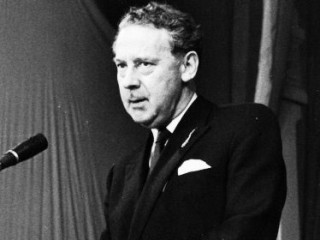
Hugh Gaitskell biography
Date of birth : 1906-04-06
Date of death : 1963-01-18
Birthplace : London, England
Nationality : British
Category : Politics
Last modified : 2011-06-20
Credited as : Politician, Labour Party ,
Hugh Todd-Naylor Gaitskell was born in London on April 9, 1906, the son of Arthur Gaitskell, an Indian civil servant. He had a middle-class upbringing which included periods of time spent in Burma. He was educated at Winchester and New College, Oxford, where he received first class honors in "Modern Greats" (politics, philosophy, and economics) in 1927.
For the next ten years Gaitskell pursued a career in teaching. He lectured to Nottingham miners for a year (1927-1928) on behalf of the Workers' Educational Association, his first extended contact with working-class life. Then he taught economics and politics at University College, London, rising to the position of reader in political economy in 1938. In 1937 he married Dora Frost, with whom he had two daughters.
Gaitskell's interest in socialism was stimulated initially during his student days at Oxford, where he came under the influence of G. D. H. Cole, the socialist philosopher and historian. His first political act was to assist the workers in Oxford during the nine days' general strike of 1926. In 1935 he ran unsuccessfully as Labour Party candidate for a parliamentary seat at Chatham. He began to make speeches and to participate in party activities. He advocated collective security against fascism and took a moderate socialist line on economic questions, arguing in favor of social equality and against revolution.
During World War II Gaitskell joined the civil service on a temporary basis. He served in several important ministries and worked closely with the Labour politician Hugh Dalton. In the general election of 1945 he won the seat in Parliament for Leeds South, which he held for the remainder of his life. In the postwar government of Clement Attlee he was appointed to the positions of minister of fuel and power (1947-1950), minister of state for economic affairs (1950), and chancellor of the exchequer (1950-1951). As chancellor he introduced charges into the hitherto free National Health Service.
In 1951 the Conservative Party was returned to power, and Gaitskell never again held governmental office. Yet his political influence continued to grow, based as it was on a reputation for integrity and commitment to principle. In 1955, upon the resignation of Attlee, Gaitskell won the leadership of the Labour Party with a decisive victory over Herbert Morrison and Aneurin Bevan, a leader of the party's more radical wing.
Gaitskell steered the Labour Party in a moderate direction from 1955 until his death in 1963. He vigorously opposed the invasion of the Suez Canal by Britain, France, and Israel in 1956. He also tried to modify the party's commitment to the nationalization of industry, as embodied in clause four of its constitution. After losing the general election of October 1959 decisively to Harold Macmillan and the Conservatives, Gaitskell came under attack and the Labour Party began to divide into factions. At its annual conference at Scarborough a resolution was carried by the more radical faction led by Bevan endorsing unilateral nuclear disarmament. Gaitskell, a strong supporter of the North Atlantic Treaty Organization (NATO) alliance, made the most famous speech of his career on this occasion, vowing to "fight and fight and fight again to save the Party we love." The following year, at Blackpool, the party reversed the disarmament resolution by an overwhelming majority and re-established Gaitskell's authority as leader. It also gave him support on the clause four issue. In 1962 he used this authority to affirm the party's opposition to joining the European Common Market on the terms then being offered.
While at the peak of his influence Gaitskell became ill with a viral infection and died suddenly on January 18, 1963. His reputation as a political leader remained high. As both a conciliator and a vigorous fighter for his beliefs, he led the Labour Party in a moderate direction. He invariably argued his case with intellectual distinction. It is generally conceded, even by his political opponents, that he would have been an effective, perhaps an outstanding, prime minister.
















